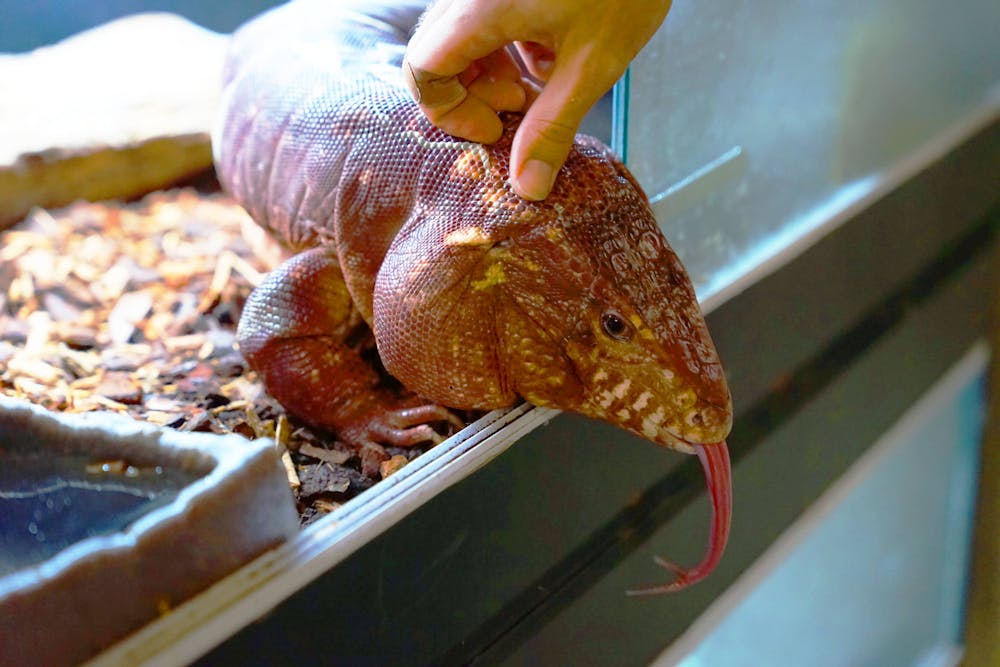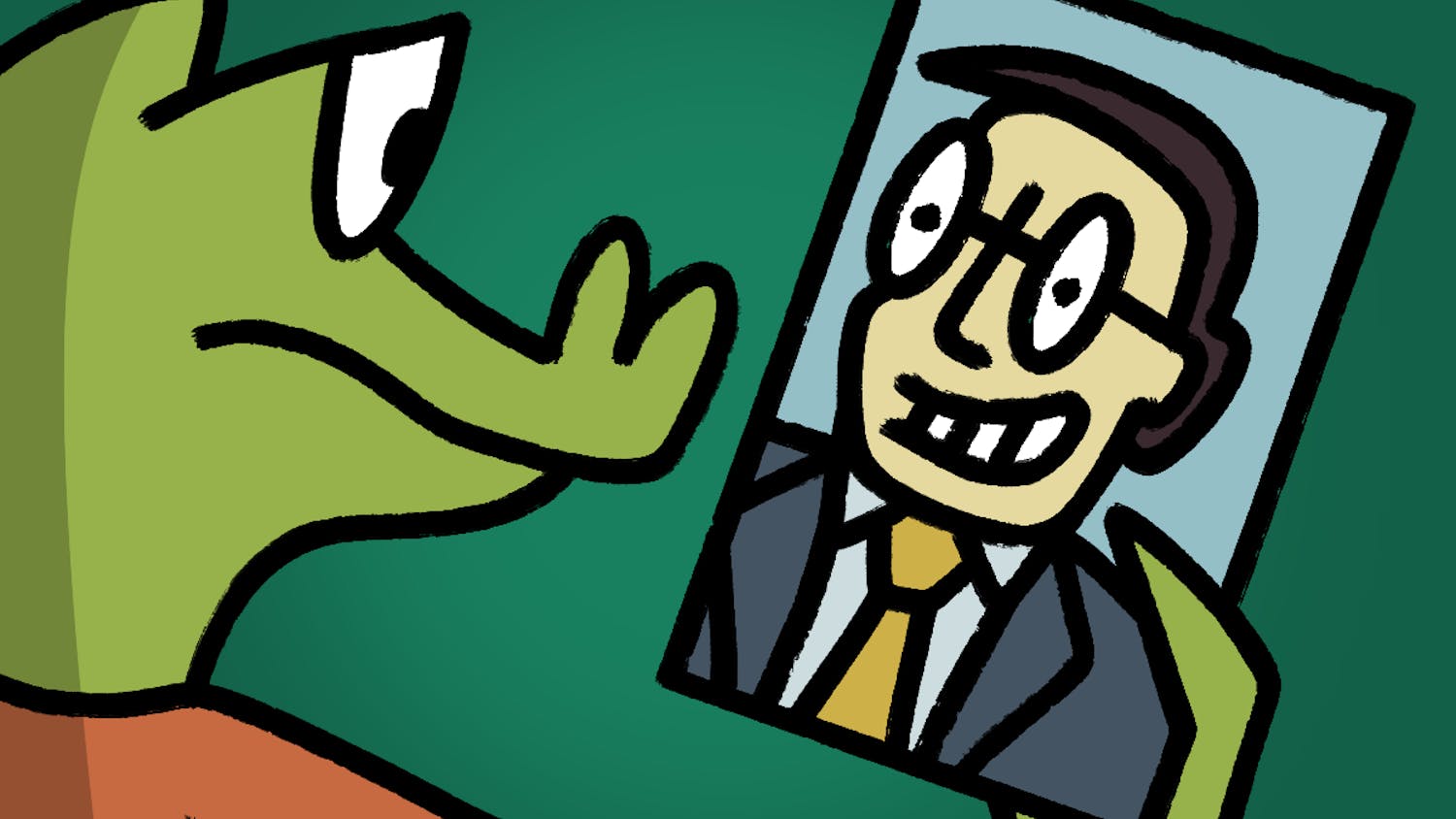Some reptiles crawl, some slither and some are prohibited in the state of Florida.
In late July, a red tegu escaped life as a pampered house pet and began roaming around Alachua County. The 3-foot, 30-pound venomous South American lizard eventually settled to bask on a residential asphalt driveway.
In Florida, possession and release of tegus is prohibited.
Gov. Ron DeSantis approved HB 1161, a bill revising the penalties for released or escaped non-native venomous reptiles. The bill increased the previous penalty for dealing with venomous reptiles without a license issued by the Florida Fish and Wildlife Conservation Commission from a criminal misdemeanor to a felony charge.
If charged, the consequences may range from five years of jail time to thousands of dollars in fines. The law went into effect July 1.
Scott Myers, the 26-year-old manager of Gator City Reptiles, has always been interested in reptiles, he said. He routinely gets called for monitor calls where he’ll capture and relocate reptiles.
Myers was called to collect the red tegu.
Most of the time, people will overreact to reptiles, Myers said. However, when he got the call for the tegu, it was an underreaction, he said.
“It’s a pretty hefty lizard, and it’s very powerful,” he said. “An animal that size can do serious damage. It could take pieces of you off very easily.”
However, the tegu caught by Myers was docile.
“Thankfully, [the tegu] is actually a really sweet animal,” Myers said.
The previous owner seemed to have taken good care of the tegu, he said. However, they brought it into the state without the proper permits, Myers said.
The state of Florida made its laws regarding prohibited and venomous species stricter than other states, he said.
Myers explained how the requirements to handle venomous species from the state included 1,000 hours of training, in addition to taking a test in some instances, he said.
“You have to handle sales on crocodilians and venomous species differently than you do with all the other animals,” Myers said. “The person has to have a permit and the whole transaction has to be approved by the FWC.”
Myers looks to these animals for their educational opportunities despite the frightening reputation of some reptiles. Possession of this lizard is now limited to research, education, control or eradication and for qualifying commercial use sales and pet owners, according to Florida’s Prohibited Nonnative Species List.
“You don’t need to be afraid of these things and be scared of them,” he said. “It’s good to respect them and understand them, but no need to be afraid of them.”
A sweet, nonvenomous sailfin dragon named Ducky waddled around the Gator City Reptiles store with eager webbed feet.
Ducky, a big-bodied gal with frail bones, descended from dinosaurs, making her one of the most prehistoric lizards on the planet, Myers said. She served as an educational ambassador for the store, greeting guests with big, black beady eyes and demanding attention.
“Another part of the industry is realizing that these things aren’t just a product, they’re not just an animal, they’re actually really intelligent,” Myers said.
Kenneth Holmes, an FWC investigator, has worked for the department for almost 27 years. Holmes showed up at the store to scan the red tegu for microchips and to check up on her condition.
The primary function of HB 1161 was to heighten the penalty to a felony to thwart the illegal ownership and distribution of venomous reptile species, Holmes said. The bill could be a reaction to the FWC’s recent undercover operation in which multiple people were exposed for selling venomous reptiles to unlicensed individuals, Holmes said.
The operation, dubbed ‘Operation Viper’, went public after the FWC filed charges against eight venomous and prohibited reptile traffickers Jan. 12.
Holmes hopes the bill’s increased felony penalty will heighten awareness and serve as a deterrent for illegal activity.
Part of Holmes’ job is to inspect facilities and make sure the animals are being housed appropriately for the public and the environment’s protection, he said.
“A red tegu can actually survive the winter here,” Holmes said. “They roam, and they pretty much eat everything.”
Tegus’ ability to adapt to foreign habitats makes them a threat to native species, creating stress and competition for resources. Holmes compared the ecological impact non-native species can have to the notorious problem of Burmese pythons in the Everglades.
The Burmese python, while nonvenomous, still wreaks havoc against the native wildlife of Florida. A large constrictor like the Burmese python can cause harm to individual people as well, Holmes said.
“Even before, when it was a criminal misdemeanor, you still looked up to 60 days in jail and a $500 fine,” Holmes said. “Now with a felony, you’re looking up to possibly years of jail.”
However, not all the people who violate the rules necessarily face jail time, especially on their first violation, he said.
“It’s not just mere possession that heightens it up to a felony,” Holmes said. “It’s possession with sales to unlicensed individuals, which causes a danger because we don’t know what experience hours those people have.”
Currently, in Florida, one would need a thousand hours of experience for each of the five families of venomous reptiles, Holmes said.
“It’s pretty extensive, so we’re comfortable knowing that the people that are properly licensed in Florida have the ability to safely keep them,” Holmes added.
As a representative of the FWC, Holmes said the commission has an amnesty program.
“So if this individual had a tegu, …if he comes forward to us we don’t charge him with anything,” he said. “We give them amnesty, and we find a good place for the animal.”
Robert Ossiboff, a 41-year-old veterinary anatomic pathologist and UF clinical associate professor, noted the importance of preserving even the unpopular species.
“When you have species that are declining and you have species that there may not be the most popular opinion of, they’re the ones that need the most help,” Ossiboff said.
He aimed to combine his skills in veterinary medicine and pathology research to better understand the diseases of reptiles, he said.
When animals undergo rapid global movement, there is an increased chance for disease and even death, Ossiboff said.
He recognized many people have an initial fear of these reptiles. That fear is almost instinctual, he said.
“It almost makes me feel, because I don’t have that fear, that I have more of a responsibility to try and help,” Ossiboff said.
The consequences of releasing a venomous snake don’t differ much from releasing a nonvenomous one, he said. Ecologically both pose a similar threat, Ossiboff added.
“I think more of the concern is that venomous snakes have a bad reputation,” he said. “People are scared of them, and so when there’s the risk of release of a venomous snake it incites more of an instinctual fear response.”
The risk is when multiple animals are released, which could then potentially establish a population in foreign ecosystems if the conditions are correct, he said.
“I fear that if people cannot have regular access to reptiles or be exposed to them in captivity because there is such an inherent fear associated with those species, we might lose more positive public perception of those animals, and then we get into a bigger problem,” Ossiboff said.
For now, the red tegu basks under the heat lamp of its new home, Gator City Reptiles, away from the Florida wildlife it might’ve endangered.
Contact Valentina at vsarmiento@alligator.org.
Valentina Sarmiento is a UF journalism senior with a specialization in photojournalism. She is an Avenue staff writer for The Alligator. Aside from storytelling, she enjoys binging horror movies, cats and the occult.






